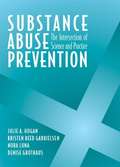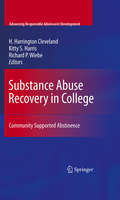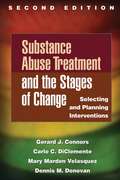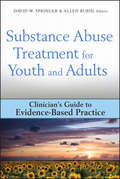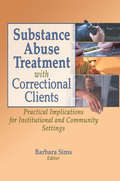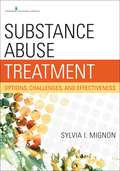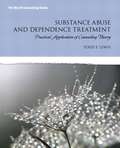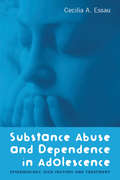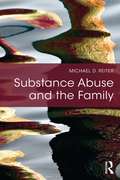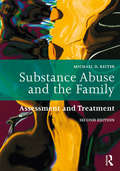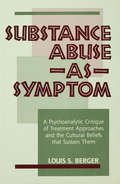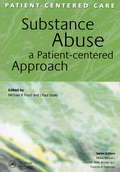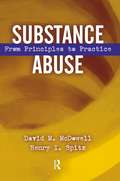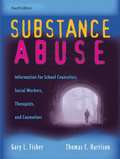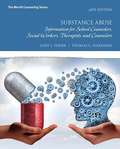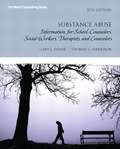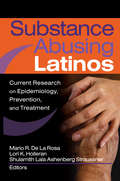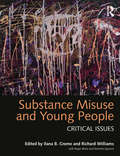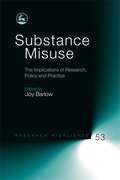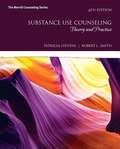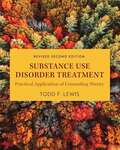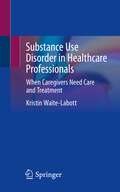- Table View
- List View
Substance Abuse Prevention: The Intersection Of Science And Practice
by Julie Hogan Kristen Gabrielsen Denise Grothaus Nora LunaThis text teaches students about the science-based components of substance abuse prevention practice. This cutting-edge book responds to the growing need for a textbook that addresses the rapid development of the substance abuse prevention profession. Finally, professors have a text that supports the content of their prevention courses! Substance Abuse Prevention presents the most current knowledge in the field, analyzing what does and doesn't work in the implementation of prevention programs. The text also prepares students for the successful completion of the ICRC examination.
Substance Abuse Recovery in College
by Kitty S. Harris Richard P. Wiebe H. Harrington ClevelandSubstance Abuse Recovery in College explains in authoritative detail what collegiate recovery communities are, the types of services they provide, and their role in the context of campus life, with extended examples from Texas Tech University's influential CSAR (Center for the Study of Addiction and Recovery) program. Using data from both conventional surveys and end-of-day daily Palm Pilot assessments as well as focus groups, the book examines community members' experiences. In addition, the importance of a positive relationship between the recovery community and the school administration is emphasized. Topics covered include: The growing need for recovery services at colleges. How recovery communities support abstinence and relapse prevention. Who are community members and their addiction and treatment histories. Daily lives of young adults in a collegiate recovery community. Challenges and opportunities in establishing recovery communities on campus. Building abstinence support into an academic curriculum. This volume offers clear insights and up-close perspectives of importance to developmental and clinical child psychologists, social workers, higher education policymakers, and related professionals in human development, family studies, student services, college health care, and community services.
Substance Abuse Treatment and the Stages of Change, Second Edition
by Carlo C. Diclemente Mary Marden Velasquez Dennis M. Donovan Gerard J. ConnorsA widely adopted practitioner resource and course text, this book shows how to apply knowledge about behavior change in general--and the stages-of-change model in particular--to make substance abuse treatment more effective. The authors are leaders in the field who describe ways to tailor interventions for clients with varying levels of motivation or readiness to change. They draw on cutting-edge theory and research to explain what works (and what doesn't work) at different stages of change. Rich clinical examples illustrate the "whats," "whys," and "how-tos" of using the stages-of-change model to inform treatment planning and intervention for individuals, groups, couples, and families. New to This Edition *Reflects the ongoing development of the stages-of-change model and research advances over the past decade. *Chapter on stage-based brief interventions in health care, social service, and community settings. *Group treatment chapter has been significantly revised. *Expanded coverage of the change processes relevant to each stage.
Substance Abuse Treatment and the Stages of Change, Second Edition: Selecting and Planning Interventions
by Carlo C. Diclemente Mary Marden Velasquez Dennis M. Donovan Gerard J. ConnorsA widely adopted practitioner resource and course text, this book shows how to apply knowledge about behavior change in general -- and the stages-of-change model in particular -- to make substance abuse treatment more effective. The authors are leaders in the field who describe ways to tailor interventions for clients with varying levels of motivation or readiness to change. They draw on cutting-edge theory and research on the transtheoretical model to explain what works (and what doesn't work) at different stages of change. Rich clinical examples illustrate the "whats," "whys," and "how-tos" of using the stages-of-change model to inform treatment planning and intervention for individuals, groups, couples, and families. New to This Edition *Reflects the ongoing development of the stages-of-change model and research advances over the past decade. *Chapter on stage-based brief interventions in health care, social service, and community settings. *Group treatment chapter has been significantly revised. *Expanded coverage of the change processes relevant to each stage. See also Group Treatment for Substance Abuse, Second Edition, by Mary Marden Velasquez et al., a manual for a group-based approach grounded in the transtheoretical model.
Substance Abuse Treatment for Youth and Adults
by Allen Rubin David W. SpringerState-of-the-art, empirical support for the treatmentof substance abusePart of the Clinician's Guide to Evidence-Based Practice Series, Substance Abuse Treatment for Youth and Adults provides busy mental health practitioners with detailed, step-by-step guidance for implementing clinical interventions that are supported by the latest scientific evidence.Edited by renowned educators David W. Springer and Allen Rubin, this thorough yet practical reference draws on a roster of experts and researchers in the field who have assembled state-of-the-art knowledge into this well-rounded guide. Each chapter serves as a practitioner-focused how-to guide and covers interventions that have the best empirical support for treating substance abuse problems, including:Family behavior therapy for substance abuse and associated problemsMotivational interviewingProblem solving and social skills trainingAdolescent community reinforcement approach (A-CRA)Cognitive behavioral coping skills therapy for adultsSeeking Safety treatment for clients with PTSD and substance abuseEasy-to-use and accessible in tone, Substance Abuse Treatment for Youth and Adults is an indispensable resource for practitioners who would like to implement evidence-based, compassionate, effective interventions in their care of substance-abusing clients.
Substance Abuse Treatment with Correctional Clients: Practical Implications for Institutional and Community Settings
by Barbara Sims Letitia C PalloneExplore the possibilities for successfully treating incarcerated or community-based substance abusersSubstance Abuse Treatment with Correctional Clients: Practical Implications for Institutional and Community Settings provides key research findings and policy implications for treating alcohol- and drug-addicted correctional clients. This book addresses a range of critical issues associated with delivering treatment in institutional and community settings. The critical thinking questions, tables, extensive bibliographies, and name and subject index will help academics and practitioners in criminal justice, sociology, counseling/psychology, and public policy. Substance Abuse Treatment with Correctional Clients shares the practical knowledge of researchers and practitioners in the fields of drug and alcohol addictions, substance abuse counseling, and criminal justice. The first section provides a review of the theoretical explanations for substance abuse, "best practice" treatment programs for substance abusers, and the use of coerced/mandated treatment. The second section addresses the substance-addicted offender in the institutional setting, the third includes works that describe community-based treatment programs and the problems associated with them, and the fourth looks at special treatment populations, including juveniles and adolescent females. In Substance Abuse Treatment with Correctional Clients, you will find: reviews of various types of treatment programs being used to treat substance-addicted individuals a study of the predictors of success and/or failure in corrections-based substance abuse programming-how to identify and use the predictors to prevent relapse arguments for and against coerced treatment in the correctional environment, and the concept of "motivation" a thorough investigation of the therapeutic community (TC) program for institutional-based substance abusers descriptions of treatment programming designed specifically for substance abusing community corrections clients-drug courts and Pennsylvania&’s Restrictive Intermediate Punishment treatment programSubstance Abuse Treatment with Correctional Clients guides you through the major policy issues faced by those who provide substance abuse treatment under what can only be described as coercive circumstances. In this important resource, you will discover major treatment modules as well as advice for working with adult, juvenile, and male or female offenders. This book provides you with the techniques that treatment communities need for helping offenders stay clean after they re-enter the community environment.
Substance Abuse Treatment: Options, Challenges, And Effectiveness
by Sylvia I. MignonThis is the first compendium of the entire range of options available for treating substance abuse, with a focus on effectiveness. The book synthesizes treatment approaches from medicine, psychology, sociology, and social work, and investigates regimens that range from brief interventions to the most intensive and expensive types of inpatient treatment programs. It examines controversies over best practices in substance treatment and closely analyzes current research findings and their applicability for improving substance abuse treatment in the future. Written for both academics and clinicians, the book translates complex research findings into an easily understandable format. Substance Abuse Treatment examines the circumstances under which a treatment is considered effective and how effectiveness is measured. It discusses treatment goals and looks at the importance of client motivation in positive treatment outcomes. A great variety of inpatient and outpatient treatment options are examined, as are self-help programs such as Alcoholics Anonymous. This segues to a discussion of the changing role of self-help programs in treatment. The text also analyzes changes in the substance abuse treatment industry that make treatment more costly and less available to those without financial resources. It gives special attention to the treatment of diverse populations, those with co-occurring disorders, and criminal justice populations. National, state, and local prevention efforts are covered as well as substance abuse prevention and future issues in treatment. The book is intended for undergraduate and graduate substance abuse courses in all relevant areas of study. In addition, it will be an important reference for substance abuse clinicians and other health professionals who treat patients with substance abuse issues. Key Features: Comprises a comprehensive, up-to-date, and practical guide to the field of substance abuse treatment and its efficacy Synthesizes treatment approaches from medicine, psychology, sociology, and social work Investigates all regimens ranging from brief interventions to intensive inpatient treatment programs, from outpatient to 12-step programs Explores the changing role of self-help programs in treatment Includes chapters on substance abuse treatment with special populations including children/adolescents, women, older adults, and criminal offenders
Substance Abuse and Addiction Treatment: Practical Application of Counseling Theory
by Todd F. LewisSubstance Abuse and Addiction Treatment shows how to help clients struggling with addiction by looking through the lens of counseling theory. After tackling basic concepts of substance abuse and dependence counseling, it looks at different counseling theories and how each supports the client with substance abuse issues. Offering more how-to's than most books, the author provides concrete descriptions of counseling theory in action, so readers know how to intervene during a real counseling session. A consistent case study is used throughout the entire book to illustrate different treatment approaches and techniques.
Substance Abuse and Dependence in Adolescence: Epidemiology, Risk Factors and Treatment
by Cecilia A. EssauRecent years have seen a growth in the numbers of studies of substance abuse and dependence in adolescence, focusing on prevalence, risk factors, comorbidity, course and outcome. At the same time, numerous prevention and intervention strategies have been developed. Substance Abuse and Dependence in Adolescence presents a comprehensive review of state-of-the-art empirical and practical information on this topic.Cecilia A. Essau, along with an eminent group of international researchers and clinicians, summarises the most recent empirical findings and state-of-the-art knowledge on substance abuse and dependence in adolescence and includes comprehensive information on prevention and treatment. Substance Abuse and Dependence in Adolescence contains:* general issues related to substance use disorders* epidemiology, comorbidity, course, outcome and risk factors* the prevention and intervention of substance abuse and dependence* a discussion of progress and unresolved issues in substance use disorders* recommendations for future studies in the field.Substance Abuse and Dependence in Adolescence will be an invaluable resource for students, researchers, and other professionals working in the fields of psychology, psychiatry, paediatrics, social work and other mental health professions.
Substance Abuse and the Family
by Michael D. ReiterSubstance Abuse and the Family demonstrates what it means to view addiction through a systems lens by considering biology and genetics, family relationships, and larger systems. Throughout the text, Michael D. Reiter shows how to examine a person's predilection to become addicted, his or her social environment around substance use, the functionality of his or her family, and various treatment options. Chapters are organized around two sections: Assessment and Treatment. The first section pays attention to how the family system organizes around substance use and abuse. Here family roles, culture, and other issues such as family violence and resilience are covered. Two chapters are also included on the neuroscience and genetics of addiction, with contributions from Jaime L. Tartar and Christina Gobin. There are also chapters on working with partial systems, using genograms, and working in a culturally-sensitive way (with contributions from Dalis Arismendi), with culture-specific consideration paid to African American, Hispanic and Latin American, Asian American, and Native American families. The second half of the book explores what a systems orientation means in practice and goes over self-help groups for individuals and families. An overview of the major family therapy theories is included, which examines intergenerational, experiential, communication approaches, strategic, systemic, and post-modern models. A separate chapter examines issues faced by both youth and adult children of alcoholics. Intended for undergraduate and graduate students, as well as beginning practitioners, this text is one of the most penetrating and in-depth examinations on the topic available. .
Substance Abuse and the Family: Assessment and Treatment
by Michael D. ReiterIn this updated edition of Substance Abuse and the Family, Michael D. Reiter examines addiction through a family systems lens which considers a range of interconnected contexts, such as biology and genetics, family relationships, and larger systems. Chapters are organized around two sections: Assessment and Treatment. Examining how the family system organizes around substance use and abuse, the first section includes contributions on the neurobiology and genetics of addiction, as well as chapters on family diversity, issues in substance-using families, and working in a culturally sensitive way. The second half of the book explores various treatment options for individuals and families presenting with substance abuse issues, providing an overview of the major family therapy theories, and chapters on self-help groups and the process of family recovery. The second edition has many useful additions including a revision of the family diversity chapter to consider sexual and gender minorities, brand new chapters on behavioral addictions such as sex and gambling, and a chapter on ethical implications in substance abuse work with families. Additional sections include information on Multisystemic Therapy, Behavioral Couples Therapy, Motivational Interviewing, and Twelve-Step Facilitation. Each chapter now contains a case application to help demonstrate treatment strategies in practice. Intended for undergraduate and graduate students, as well as beginning practitioners, Substance Abuse and the Family, 2nd Ed. remains one of the most penetrating and in-depth examinations on the topic available.
Substance Abuse as Symptom: A Psychoanalytic Critique of Treatment Approaches and the Cultural Beliefs That Sustain Them
by Louis S. BergerWhat can psychoanalysis contribute to an understanding of the etiology, treatment, and prevention of substance abuse? Here, Louis Berger contests both the orthodox view of substance abuse as a "disease" explicable within the medical model, and the fashionable dissenting view that substance abuse is a habit controllable through the "willpower" fostered by superficial treatment approaches. According to Berger, substance abuse is first and foremost a symptom. He argues that it is only by grasping this fact that we can understand why standard approaches to treatment and prevention have failed. Berger invokes a wide spectrum of recent analytic insights about infant and child development, the psychology of narcissism, and primitive character disorders in making the case that substance abuse masks serious preoedipal (or "midrange") psychopathology. Such psychopathology, operating at both cultural and person levels, explains why certain individuals become dependent on illicit drugs; it is equally revelatory of why the substance abuse "establishment" -- and society at large -- continues to misconstrue the nature of the problem and to proffer ill-conceived and ineffective remedies. After thoroughly examining the motives, conscious and unconscious, that maintain "mainstream" myths about substance abuse, Berger points the way to alternative approaches to prevention and treatment.
Substance Abuse: A Patient-Centered Approach
by Michael Floyd J Paul SealeSeries Editors: Moira Stewart, Judith Belle Brown and Thomas R Freeman Primary care clinicians are often unfamiliar with new and effective methods for detecting substance abuse problems in their earliest stages, and the majority of patients with substance abuse problems remain undiagnosed. Substance Abuse is written by primary care clinicians and focused to meet the needs of primary care providers, demonstrating how the patient-centered clinical method can assist clinicians in learning how to diagnose this complex psychosocial disorder. This book describes how to use state-of-the-art screening techniques, and how to understand and motivate patients to decrease or eliminate harmful use of alcohol and drugs. It presents the latest scientific findings and gives examples of using a patient-centered approach, as well as describing specific communication skills, with samples of dialogue illustrating their use in helping substance-abusing patients. This is essential reading for all family doctors, paediatricians, gynaecologists, psychiatrists, nurses, social workers, psychologists and all clinicians whose practices include substance abusing patients. It will also appeal to counsellors, education personnel and all professionals working with substance abusing individuals.
Substance Abuse: From Princeples to Practice
by Henry I. Spitz David McDowellDesigned as a 'one-stop shopping' tool for anyone interested in or affected by substance abuse, this book provides detailed discussions that include the history, chemistry, biology, epidemiology, and salient characteristics of the most important and prevalent abused substances.
Substance Abuse: Information for School Counselors, Social Workers, Therapists, and Counselors (4th edition)
by Gary L. Fisher Thomas C. HarrisonWeaving actual clinical examples with solid research, Substance Abuse continues to provide counseling, social work, and other students with a detailed overview of the alcohol and other drug (AOD) field. Now in its Third Edition, this text provides updated coverage and practical clinical examples to reflect the rapid changes in the field of addiction. In a reader-friendly style, the authors present balanced coverage of various treatment models as well as objective discussions of the controversies in the field. The text covers topics spanning the entire field--pharmacology, assessment and diagnosis, treatment, recovery, prevention, children, families, and other addictions--providing students with a broad view of the AOD field as well as the pervasiveness of the problem in all areas of behavioral health and general fields.
Substance Abuse: Information for School Counselors, Social Workers, Therapists, and Counselors (Sixth Edition)
by Gary L. Fisher Thomas C. Harrison<p>In an accessible writing style, Fisher and Harrison’s Substance Abuse: Information for School Counselors, Social Workers, Therapists and Counselors presents succinct, practical coverage of alcohol and other drug prevention, treatment, and recovery for generalist students, prospective mental health professionals, and allied professionals. It includes basic information on substances of abuse and focuses on clinically relevant knowledge on such topics as cultural competence, co-occurring disorders, other behavioral addictions, children and families, and ethics and confidentiality. <p>Each chapter includes clinical application cases and questions for further discussion. The new edition inclues a new chapter on “Co-Occurring Disorders and Other Special Populations,” new information on cultural competencies and intervening with special populations such as the elderly and LGBTQQI, and new information on risk factors for alcohol and other drugs for culturally and ethnically diverse populations. </p>
Substance Abuse: Information for School Counselors, Social Workers, Therapists, and Counselors,
by Thomas C. Harrison; Gary L. FisherIt combines the accessible writing style and succinct, practical topical coverage that have made it a market-leading resource for generalist students, prospective mental health professionals, and allied professionals.
Substance Abusing Latinos: Current Research on Epidemiology, Prevention, and Treatment
by Shulamith L Straussner Mario De La Rosa Lori HolleranDiscover the role culture, family, and environment have in the prevention of Latino substance abuseInformation about the substance abuse behaviors among Latino populations has been limited. Substance Abusing Latinos: Current Research on Epidemiology, Prevention, and Treatment fills this void by presenting the latest research on the epidemic of substance abuse now afflicting the Latino community. Ethnic differences are reviewed, including specific studies covering gang members, low-income urban women, risky behaviors, and language preference indicators of acculturation. This book does more than simply present the research-it discusses effective treatment strategies to help practitioners provide quality, culturally competent care to lacking Latino populations. Latinos, the largest minority in the United States, have an increasing alcohol and illicit drug use problem. Culture, acculturation, and language hold powerful sway in the research of Latino/a substance abuse. Substance Abusing Latinos: Current Research on Epidemiology, Prevention, and Treatment delves deeply into troubling issues such as gang membership, sexual abuse, the lack of healthy family role models, the effects of different levels of acculturation, the lack of health insurance, and rampant involvement with the criminal system. The research is used as a foundation to focus on the latest advances of substance abuse prevention and culturally competent intervention programs.Each chapter is extensively referenced to reinforce research.Substance Abusing Latinos: Current Research on Epidemiology, Prevention, and Treatment explores: substance abuse among gang members in a small city childhood sexual abuse and drug use among low-income Puerto Rican women a comparison of risky behaviors of African-American and Cuban-American adolescent juvenile offenders acculturation status and substance use prevention with Mexican and Mexican-American youth culturally competent intervention with families of Latino youth at risk for drug abuse psychiatric, family, and ethnicity-related factors that can impact treatment among Hispanic substance abusing adolescents HIV/AIDS prevention practice with substance abusersSubstance Abusing Latinos: Current Research on Epidemiology, Prevention, and Treatment is essential reading for educators, students, practitioners working with Latino/a populations, and substance abuse researchers.
Substance Dependence and Co-Occurring Psychiatric Disorders: Best Practice for Diagnosis and Clinical Treatment
by Edward V. Nunes Jeffrey Selzer Petros Levounis Carrie A. DaviesNow in one authoritative source: What everyone who treats substance abuse must know about co- occurring psychiatric disorders... This master reference, developed by a team of nationally known and respected researchers, clinicians, and program directors, is the first comprehensive handbook that provides a full treatment of all the most common psychiatric conditions that typically co-occur with substance use disorders. This is an essential guide for everyone who treats addiction, as well as for psychiatric clinicians- designed to help you develop and improve critical diagnostic skills and create coordinated treatment plans that achieve positive outcomes.
Substance Misuse and Young People: Critical Issues
by Richard Williams Ilana CromeSubstance Misuse and Young People: Critical Issues is a comprehensive source of information on young people’s requirements for assessment, treatment and other interventions because of their misuse of substances. It highlights approaches that enhance understanding of the routes that lead young people to substance misuse and also the routes away from it. The emergence of new substances and methods of misuse makes this ever more relevant. The authors are international experts in the fields of psychiatry, paediatrics, medicine, psychology, genetics, resilience, neuropharmacology and epidemiology. This book acknowledges how widespread both substance misuse and psychiatric disorders are and explores the complex, challenging links between co-occurring conditions. Use of substances is associated with illness and premature mortality, and more so for people who have combined disorders. The authors critically assess the vital need for intervention during adolescence and early adulthood. They provide detailed clinical views of the psychosocial interventions and medications currently available and illustrate them with case studies that emphasise adolescents’ experiences and thoughtful lifestyle-specific interventions. This book provides theoretical knowledge and indicates the practical skills that practitioners require for work with young people who misuse substances. It is highly applicable to medical practitioners, psychologists, pharmacists, social workers, police officers, probation officers, educationalists and related social and healthcare professionals.
Substance Misuse: The Implications of Research, Policy and Practice
by Peter Kemp Lisa Jones Toby Seddon Richard Ives Donald Forrester Linda Mckie Joy Barlow Neil Hunter Harry Sumnall Sally Haw Viv Evans Megan Larken James Egan Jack Law Anne Bryce Gerard Vaughn Maurizio Coletti Brian Kidd Jo Neale Margaret Black Neil Mckeganey Jane Fountain Joyce Nicholson Bernadette Monaghan Charlie LlyodSubstance misuse and its pervasive problems is a constant challenge for social work, health and related professionals today. With heightened political and policy emphasis on all aspects of substance misuse, it is paramount that professionals remain up-to-date on current issues and their responsibilities. Based on research and evidence, this book provides a sound basis for grounded and innovative practice. Leading international contributors outline holistic and specialist approaches to policy and practice, and highlight the shift in emphasis from immediate risk minimisation to long-term recovery, the importance of prevention and the pivotal role of workforce development. Issues surrounding work with children and families affected by substance misuse are explored, and ways of implementing new approaches revealed. The book also looks at the impact of the smoking ban in Scotland, and suggests ways to support tobacco use cessation. This book is essential reading for all front-line practitioners working with substance misusers, including social work, health professionals and counsellors.
Substance Use Counseling (Sixth Edition): Theory and Practice
by Robert L. Smith Patricia W. StevensA step-by-step guide through the process of working with substance-abuse and/or behavioral addiction clients. Substance Use Counseling offers prospective and practicing clinicians and counselors a sound base of knowledge about alcohol, tobacco, and other drugs (ATOD), and practical help for working with individuals and families who seek assistance for substance abuse and/or behavioral addiction.
Substance Use Disorder Treatment: Practical Application of Counseling Theory
by Todd F LewisSubstance Use Disorder Treatment: Practical Application of Counseling Theory examines substance use disorder counseling through the lens of major counseling theories. It provides descriptions of counseling theory in action and demonstrates the application of various theories in real-world contexts. Part I of the text reviews essential information related to substance use disorder treatment, including the models of substance use, ethical issues, assessment, and diagnosis. In Parts II and III, each chapter introduces a major counseling theory, applies the theory to substance use disorder counseling, and reviews its strengths, limitations, and ethical issues. Readers develop a solid knowledge base of substance use disorder counseling, learn how to effectively intervene during sessions with clients, and develop an understanding of how to create and implement plans in support of those struggling with this condition. The second edition features new research on the correlation between neuroscience and substance use disorders, as well as updates throughout the text to align with the DSM-5. It includes fresh information on motivational interviewing - including updated terminology - and an expanded discussion of cognitive-behavior therapy models, and theoretical integration. New or updated references and research bring the second edition up-to-date. Easy to read, compassionate, and essential, Substance Use Disorder Treatment is an ideal guide for courses in substance use disorder counseling. It is also a valuable reference for practicing counselors and those in the helping professions.
Substance Use Disorder in Healthcare Professionals: When Caregivers Need Care and Treatment
by Kristin Waite-LabottThis book develops on substance use disorder in healthcare workers, a topic not often discussed. While the phenomena is nothing new, the desire to learn about it is. This book describes why substance use disorder occurs in healthcare workers, explains how to recognize substance use disorder in peers and how to care for them. It discusses the barriers to seeking treatment, provides different monitoring programs and disciplinary actions, and educates on the recovery and how those with long term recovery maintain it. This book also intends to decrease stigmatizing behaviors. While the main focus is nursing, this book can be helpful to any healthcare professional group. Dr Carmel Clancy, President of the International Nurses Society on Addictions (IntNSA), did us the honor of writing the Foreword.
Substance Use Disorders In The U.S. Armed Forces
by Committee on Prevention Treatment Diagnosis Management of Substance Use Disorders in the U.S. Armed ForcesProblems stemming from the misuse and abuse of alcohol and other drugs are by no means a new phenomenon, although the face of the issues has changed in recent years. National trends indicate substantial increases in the abuse of prescription medications. These increases are particularly prominent within the military, a population that also continues to experience long-standing issues with alcohol abuse. The problem of substance abuse within the military has come under new scrutiny in the context of the two concurrent wars in which the United States has been engaged during the past decade--in Afghanistan (Operation Enduring Freedom) and Iraq (Operation Iraqi Freedom and Operation New Dawn). Increasing rates of alcohol and other drug misuse adversely affect military readiness, family readiness, and safety, thereby posing a significant public health problem for the Department of Defense (DoD). To better understand this problem, DoD requested that the Institute of Medicine (IOM) assess the adequacy of current protocols in place across DoD and the different branches of the military pertaining to the prevention, screening, diagnosis, and treatment of substance use disorders (SUDs). Substance Use Disorders in the U. S. Armed Forces reviews the IOM's task of assessing access to SUD care for service members, members of the National Guard and Reserves, and military dependents, as well as the education and credentialing of SUD care providers, and offers specific recommendations to DoD on where and how improvements in these areas could be made.
